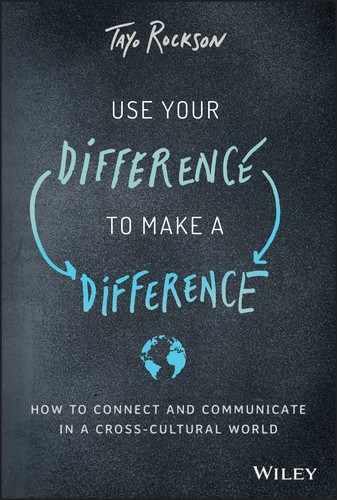15
Applying LORA to Don't Perpetuate
Remember that LORA is my acronym for Listen, Observe, Reflect, and Act, the system I developed as a way to apply every concept I explain; what's shown here is for the Don't Perpetuate framework. As in Chapter 6, what follows is both a summary and an action plan, so take out your journals and make note of all these.
Listen
Listen to the systems around you. What are some of the problematic things you hear being said about people's identities? Make note of them and write out why you believe them to be problematic.
Observe
Observe the agents of oppression around you, moments when people and institutions are othering, the power dynamics around you. How do they contribute to perpetuation of negative narratives? Who are the groups affected by the biases?
Reflect
Reflect on those agents of oppression you observed. Are you one of them? If so, what can you do? What power do you have?
- Reflect on continuous learning. How will you commit to it?
- When pushback happens, and it will, are you willing to deal with the pushback?
- Will you commit to being patient?
- Reflect on the media, literature, and art you consume on a weekly basis. Do they perpetuate negative systems of oppression?
- Reflect on the workplaces you are part of. Are you in a position to create change or call out inequalities, inequities, and injustices?
- Reflect on the education systems you are part of. Are there opportunities to create belonging for different types of people?
- Reflect on the histories and stories of all the groups around you. How will you listen to stories other than yours?
You want to get used to looking at the root of problems in institutions. What is the emotional history behind this situation, group, or issue? How might that history still influence perspectives and outcomes today?
- Reflect on the organizations you support financially. Are they perpetuating negative systems of oppression?
- Reflect on ways you have promoted exclusion and isolation in the past. How will you stop?
- Reflect on the things you share and promote. Are they dangerous?
- Reflect on ways you can be more tolerant and jot them down.
- Reflect on racist languages and how you can stop them.
- Reflect on whether you lie to yourself about the oppression around you.
- Reflect on whether you are passive in moments when you see oppression. Why or why not?
- Reflect on how you can connect to the experiences of the different stories of identities you learn about.
- Reflect on a time you felt different, ostracized, or left out. You can go back as far as your childhood if need be, but recall that experience. How did it feel? Recall this experience every time you find yourself struggling to relate to people's experiences of exclusion. It won't be the same thing, but if you tap into that experience and imagine it as daily life for oppressed people, you might get an idea.
- Reflect on how discrimination and racism can be conscious or unconscious.
- Reflect on ways you can democratize access to diverse groups in institutions.
Act
- Intervene when you see problematic behaviors that support systems of oppression.
- Support artists, politicians, and businesses who promote values that promote a celebration of humanity.
- Create platforms for diverse and inclusive stories to be told.
- Read at least one book a month about history, identity, race, diversity, equity, and inclusion. The idea is to read about a group of people different from you so that you understand systems.
- Educate people in your circle of influence on things you've learned about different identities.
- Come up with multiple sources of news.
